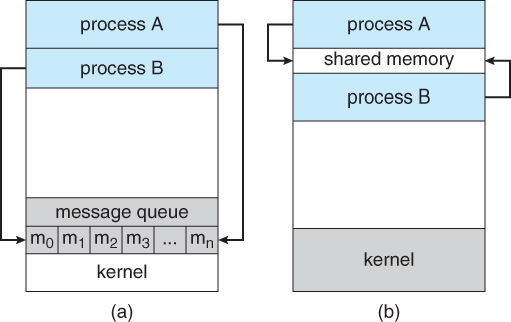[OS] Process - Interprocess communication
27 Apr 2020
Processes which affects / be affected by other processes are called cooperating process. These processes take advantage of:
- Information Sharing : Multiple user can access to same datas like sharing files.
- Computation speedup : We can divide a task into subtasks and process those tasks in parallel.
- Modularity : We may want to divide task into multiple process or threads for modularity.
- Convenience : One user may perform multiple tasks like editing, printing, compiling at same time.

Cooperating process needs Interprocess Communication : IPC There are two models for this: 1. Shared Memory 2. Message Passing
Shared Memory System
Other processes which wish to use the shared memory must then make their own system calls to attach the shared memory area onto their address space.
Datas on Shared Memory
#define BUFFER_SIZE 10
typedef struct {
. . .
} item;
item buffer[ BUFFER_SIZE ];
int in = 0;
int out = 0;
Producer
item nextProduced;
while( true ) {
nextProduced = makeNewItem( . . . );
// waits for space to be available
while( ( ( in + 1 ) % BUFFER_SIZE ) == out ) {}
buffer[ in ] = nextProduced;
in = ( in + 1 ) % BUFFER_SIZE;
}
Consumer
item nextConsumed;
while( true ) {
// waits for message
while( in == out ) {}
nextConsumed = buffer[ out ];
out = ( out + 1 ) % BUFFER_SIZE;
}
Message Passing System
Message Passing System allow processors to communicate without using shared memory. This is useful in distributed system where multiple nodes are connected via networks.
ETC
Java does not support shared memory